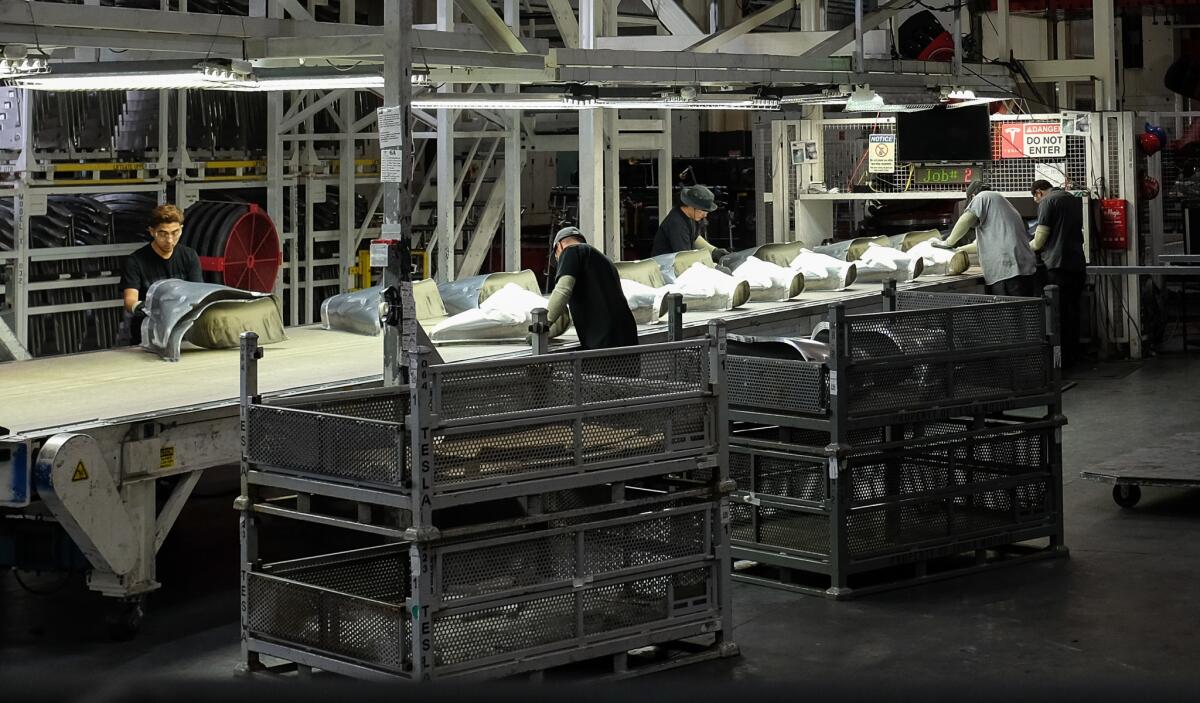Elon Musk has a lot riding on Tesla’s Model 3 — what will a unionization effort in California mean?

Reporting from San Francisco — What happens inside Tesla’s electric car factory in Fremont, Calif., this year will torque Tesla toward a sustainable future or send it on a road to ruin.
Everything at Tesla depends on the success of the Model 3, a mid-priced electric car the company plans to churn out by the hundreds of thousands each year. The Model 3 needs to be a big hit to justify high stockholder expectations and billions of dollars in capital investment at Tesla, which now sells not only cars, but batteries and solar roofs.
Mass producing high-quality, low-cost cars is a tough challenge, especially for a company that’s never done it before. Chief Executive Elon Musk has his hands full.
As the Model 3 pressure builds to a critical state, the United Auto Workers union has arrived on the scene to try to organize workers at the nonunion plant.
Whether the UAW enjoys solid support among the workforce of 6,200 or just a few chance-takers, a union drive will divert Musk’s attention at a time when he can least afford distraction. Unlike in many states, California laws and regulations make it relatively easy for union organizers to solicit converts inside the workplace without overt retribution from management.
Musk, a South African immigrant whose rise in the business world occurred in union-thin Silicon Valley, is getting a taste of what most Californians take for granted. As Harley Shaiken, a labor professor at UC Berkeley puts it: “California overall is a labor-friendly state.”
That fact struck a nerve with Musk last week when a worker at Tesla’s Fremont factory, Jose Moran, uploaded a critical post on Medium. It lambasted the electric car maker for alleged employee mistreatment: preventable injuries, long hours, bad ergonomics, few if any promotions, safety issues. Many of those complaints, he said, had been ignored.
Not only that, he announced that he was talking with the United Auto Workers about organizing workers at the plant.
Musk reacted with a flurry of tweets: The “guy was paid by the UAW to join Tesla and agitate for a union,” he tweeted to the website Gizmodo. “He doesn’t really work for us, he works for the UAW.”
“Tesla is the last car company left in California, because costs are so high,” came anther tweet. Moran’s piece, Musk continued, is “morally outrageous.”
The “intensity of his response” suggests Musk is taking the latest attempt seriously, Shaiken said.
The UAW, for the record, said it’s working with Moran but is not paying him. A Tesla spokesman declined an interview with Musk, and Moran did not respond to inquiries.
The union tried to penetrate Tesla in the past, to no avail.
Still strong at General Motors, Ford Motor and Fiat Chysler, the UAW’s attempts to organize Japanese, Korean and German auto plants in Southern states over the decades have come to naught.
Conceivably, a union would hold extra negotiating clout with Tesla given the importance of the Model 3 and the pressure on Tesla to turn it out.
Tesla sells highly successful but niche-oriented luxury cars, the Models S and X, at a rate of about 80,000 a year.
But the UAW’s chances at Tesla are slim, according to a former UAW official who worked at the plant for 22 years, when it was jointly run by Toyota and GM, before Tesla bought it in 2010.
“To be honest with you, I think they’re going to have a hard time” organizing workers, said Sergio U. Santos, who was president of UAW Local 2244 in Fremont.
They want Tesla to succeed, he said. “Half the people in there are just happy to have a job.”
There have also been political attempts to aid Tesla workers.
Last month, five Assembly members wrote a letter to Musk to protest a confidentiality agreement that Tesla workers were asked to sign in November. The controversial agreement bars them from discussing “everything you work on, learn or observe in your work” unless it’s already public information.
The broad language is a violation of federal labor law, the group said.
Tesla lawyer Todd Maron responded with a letter explaining that the company legitimately sought to staunch leaks about product launches and vehicle features that Tesla would rather competitors not know.
The politicians’ efforts are welcome, said Santos, but he doesn’t think they’ll do much to sway Tesla workers to the union side.
Santos voted for Hillary Clinton, but he said the Democratic Party, both statewide and nationally, hasn’t yet come to grips with the forces behind the popularity of Donald Trump.
“Not many [Tesla factory workers] would say they voted for Donald Trump, but out of every 10, I’ll bet eight of them did,” he said.
The reason, he said, is that blue-collar workers in Fremont believe Democrats ignored them when Toyota shut the plant down seven years ago during the auto industry’s financial turmoil. Meanwhile, they pumped federal money into new ventures that failed, notably solar power company Solyndra, which was located not far from the auto plant.
Since closing its Fremont operations, Toyota built a new plant in Mississippi and is building another in Mexico. The workers at the shuttered factory felt abandoned, he said.
Santos and Shaiken said Tesla could do more to address worker concerns. Silicon Valley and the auto industry are coming together at companies such as Tesla, and cultural differences will need to be addressed.
“It’s one thing if you’re working at a startup 18 hours a day and you’re going to be sharing in the wealth,” Shaiken said. “It’s different if you’re making $17 an hour. There may be a lack of understanding about that at Tesla.”
Tesla does offer hourly workers what it calls “restricted stock units” but, Santos said, not enough to make anybody rich.
Twitter: @russ1mitchell




